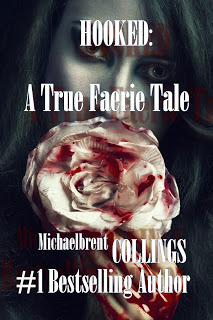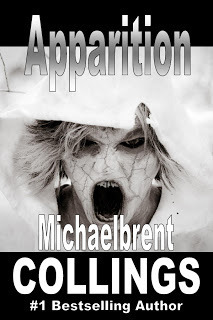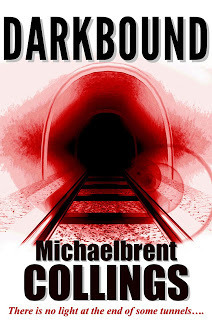Dealing Positively with Negative Reviews by Michaelbrent Collings

Okay, so, you’re published.
Your book is “out there.” It’s
“in the world” and “up for grabs.”
People can “read it” and “peruse it” at their “leisure” (I like
quotation marks).
And at first, things seem all right. Fairly predictable. The book doesn’t become an instant
bestseller, but it is selling. Your mom bought it, and your dad bought two copies, and so did that slightly
weird person who sits in your closet and mumbles a lot. Or maybe that’s just what happens to me.
Regardless, your work is now on its own. Living, breathing, and (hopefully) being
passed from hand to hand by readers who are – slowly but surely – going to
become Your People. Your Followers. Your Army.
And then it happens.
Among the four- and five-star reviews that have made you feel higher
than a kite on meth, suddenly this rears its ugly head on Amazon:
A TERRIBLE read
I
picked this boock up because of
all the good revuews. But I guess the
revuews were all dun by, like, the writers’ parents and stuff. Because
the book stunk. It stunk a lot. It stunk like a dead skunk that has
severe
dysintary and then drowns in its own poop.
Also, the author is a ca-ca doodie head and probably has lice and kix
baby seals and stuff. Dont read this
book, it will give you cooties.
- 1 star
You read it. And the
questions start. Is my work really that
bad? How could this reviewer have so
completely missed the point of my book?
Where did he learn to spell? What
if I do have lice?
And, most urgently… how do I respond?
To that last, I have three little words: Ig. Nore.
It.
Okay, maybe that’s four words, I don’t know. I’m a writer, not an accountant.

Seriously, though, when you get a review like the above, you
must simply rejoice within yourself.
Why? Because it means your book
is being read. It’s getting out into the
world, meeting new people, getting beyond the closed circles of your family,
friends, and writers groups. It will
inevitably meet up with people that hate it – because it’s not their style,
because you did an objectively terrible job writing the piece (it does happen),
or even for no good reason at all.
And like any good parent, you will have the urge to rush to
your “child’s” defense. RESIST.
There are really only two likely outcomes if you choose to
wage war on the review or (even worse) on the reviewer himself.
1)
You try
to show the review is “wrong.” The
reviewer takes offense and goes to war with you. You now have a dedicated enemy who will attack
you at every possible turn, giving you low ratings wherever possible and urging
his/her friends and family to avoid your work like a sack of rotten meat. You have just accomplished nothing more nor
less than magnifying the effect and range of the viewer’s bile and hatred. Result: you lose.
2)
You try to show the review is wrong. The reviewer takes offense and goes to war
with you. You mobilize your friends and
followers and fight back. A comment war
ensues! You beat back the scummy, evil,
poor-spelling reviewer. He/she is silenced
forever. Huzzah! But wait… those comments are there forever.
And you look like nothing more nor less than a prima donna bully. This will keep people from buying your books
in perpetuity. Result: you lose.
Of the two, the second is gratifying to the author, but far
more damaging. I am friends with a great
many authors, some of them legitimately Famous People. And occasionally one of them will get their
undies in a wad over some disparaging comment made re their work and will
mobilize their fans to attack. The fans
attack. Or some of them. Some don’t.
Some become “un”fans, turned off by the author’s childishness. And though maybe Famous People can afford to
lose fans, the average author just can’t.

An example: my most recent novel, Darkbound,
just came out.
It’s a deeply disturbing horror novel about six strangers who get on a
subway train that turns out to go everywhere BUT where they want it to.
When it was released, a very eminent horror
review site called Hellnotes wrote up a stellar review. So did several
other review sites. A friend who had received an advance copy
sent me a note saying he was… well… less than enamored of it. It was
too dark, too violent. Worried, no doubt, about typical author ego, he
asked what my response would be if he posted such a review.
My response: “Do it!”
People have a right to know others’ thoughts. The fact that this reviewer didn’t like Darkbound as much as he had liked other
books I’d written was a bummer. But it
didn’t mean the end of the world, and insisting that he love everything about
my work, all the time, would be not merely ridiculous, but counterproductive.
The reviews of our work will at times
be insightful,
helpful, warming. And sometimes it will
be shallow tripe that looks like it was probably written in crayon by a
five-year-old struggling against some weird form of Tourrette Syndrome.
Both are part of being a writer. Don’t respond to either (even the
good ones –
that can be a bit “stalky” and can also mess with your fan base). If
you want to interact with fans, get a
Facebook page, a Twitter account, or stand on a box in Hyde Park.
But leave the reviews – and reviewers – alone. Ig.
Nore. Them.
It is three words. I
counted with my fingers.
Reprinted with permission.
Michaelbrent
Collings has written numerous bestselling novels, including his latest novel http://www.amazon.com/Darkbound-ebook/dp/B00B6NY4SYDarkbound.
His wife and mommy think he is a can that is chock-full of awesome sauce.
Check him out at www.facebook.com/MichaelbrentCollings or
michaelbrentcollings.com .

Published on February 27, 2013 05:00
No comments have been added yet.



